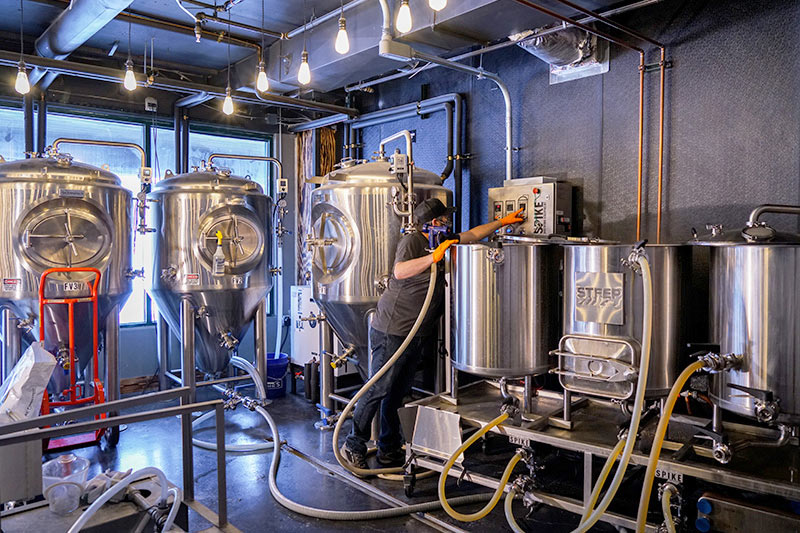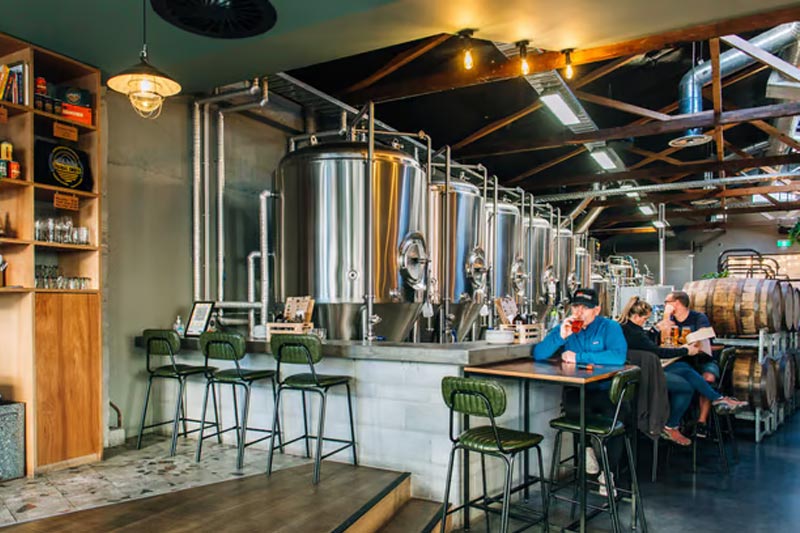Struggling to decide if a nano brewery is enough for your beer production goals? Choosing the wrong size could limit growth and profit.
A nano brewery typically produces between 1 to 3 barrels per batch, translating to around 30 to 90 gallons of beer. This scale is ideal for specialized or experimental brewing.

As a seasoned brewery equipment provider, I’ve seen firsthand how choosing the correct production scale impacts both daily operations and future growth. Let’s explore whether a nano brewery is the right fit for your brewing goals.
What Size Is a Nano Brewery?
Are you unsure what exactly defines the size of a nano brewery? Misunderstanding this could lead to investing in equipment that’s either too big or too small.
A nano brewery generally produces batches ranging from 1 to 3 barrels (30 to 90 gallons) per brew cycle. It’s smaller than microbreweries, perfect for brewing craft beers on a limited scale.

Understanding Nano Brewery Size and Production
A nano brewery is best understood through its small scale and highly specialized brewing process. Most nano breweries focus on crafting unique, limited-edition beers rather than mass production. The typical nano brewery setup includes fermenters, kettles, and cooling systems designed for smaller batch sizes.
Here’s a simplified overview:
| Equipment Type | Typical Size/Volume | Production Capacity per Batch |
|---|---|---|
| Brewing Kettle | 1-3 barrels (30-90 gallons) | ~30-90 gallons |
| Fermentation Tanks | 1-3 barrels | Up to 90 gallons |
| Cooling Systems | Small glycol chillers | For small batch control |
When I started working with brewers, I found nano breweries attractive to hobbyists or experienced brewers experimenting with unique flavors. They’re ideal for those who want to test new recipes without risking large financial investments. With nano breweries, production is often driven by passion, specialty, and the community rather than mass-market demand. Because of this limited scale, nano breweries can quickly adapt to trends and customer feedback. However, if your aim is large-scale distribution or significant growth, you might outgrow this scale quickly.
For example, a nano brewery making two batches per week (at 2 barrels per batch) produces roughly 480 barrels per year. It’s enough to supply a small local pub or specialty shop but insufficient for wider distribution. Understanding this limitation is key when deciding your brewery’s ideal size.
What Is the Difference Between a Nano Brewery and a Microbrewery?
Feeling confused between a nano brewery and a microbrewery? This confusion could impact your business strategy and profitability if not addressed clearly.
The key difference is in batch size and production scale: Nano breweries produce between 1-3 barrels per batch, while microbreweries produce 15 barrels or fewer but typically between 5-15 barrels per batch.
Nano Brewery vs. Microbrewery — A Closer Look
While both nano and microbreweries specialize in craft beer, their scale, business models, and market reach significantly differ. Here’s a clear comparison:
| Criteria | Nano Brewery | Microbrewery |
|---|---|---|
| Batch Size | 1-3 barrels | Typically 5-15 barrels per batch |
| Annual Production | Usually under 500 barrels | Usually between 500-15,000 barrels |
| Equipment Costs | Lower initial investment | Higher initial investment |
| Distribution Scope | Local, limited, specialty | Regional, potential for growth |
| Business Goals | Experimental, niche markets | Scalable, broader market focus |
In my experience, nano breweries often serve as incubators for brewers aiming to test new flavors, styles, and market reactions. They tend to be run by small teams or individuals passionate about brewing. Conversely, microbreweries aim for a balance between passion-driven brewing and commercial viability. Microbreweries usually have dedicated marketing, branding, and sales teams to distribute their products regionally or even nationally.
If your goal is to start small, experiment, and focus on local communities or unique brews, a nano brewery is a great choice. However, if you’re considering rapid growth, broader distribution, or scalable operations, investing in a microbrewery from the start might make more sense.
How Do I Start a Small Scale Brewery?
Are you overwhelmed by how to launch your small brewery dream? Missing crucial steps could cost time and money.
Starting a small-scale brewery involves creating a business plan, securing funding, choosing a suitable location, purchasing brewery equipment, acquiring necessary licenses, and launching your marketing strategy.

Step-by-Step Guide to Launching Your Small Brewery
From my interactions with successful brewers, I’ve identified several key steps that must be followed to start your brewery effectively:
1. Craft Your Business Plan
- Define your brewery’s size (nano, micro, etc.).
- Estimate initial startup costs and budget.
- Identify your target market and beer styles.
2. Secure Funding
- Consider personal savings, bank loans, investors, or crowdfunding.
- Nano breweries require less funding than microbreweries.
3. Choose the Right Location
- Pick a site considering size, utilities, accessibility, and customer traffic.
- Nano breweries fit well in smaller spaces due to their limited scale.
4. Purchase Brewery Equipment
- Fermentation tanks, kettles, bottling or kegging equipment, chillers, and filters.
- Choose reliable equipment suppliers, like Micet, for quality and support.
5. Obtain Permits and Licenses
- Brewery license, food/beverage permits, zoning clearances, and environmental approvals.
6. Develop Your Beer Recipes
- Experiment with small batches, seek feedback, and refine recipes.
7. Plan Your Marketing and Sales Strategy
- Use local events, social media, beer festivals, and tasting rooms to build brand awareness.
Starting small can reduce your risk, allowing you to adapt quickly to customer preferences and operational challenges. Following these steps helps you build a solid foundation, ensuring sustainable growth.
How Much Does It Cost to Build a Small Brewery?
Worried about budgeting for your brewery startup? Overlooking key expenses can quickly derail your dreams.
Building a small brewery usually costs between $50,000 to $500,000, depending on brewery size, equipment choice, facility renovation, licensing, and initial operating expenses. Nano breweries typically cost less.
Cost Breakdown for Small Brewery Startup
Here’s a typical cost breakdown I’ve seen in practice:
| Expense Category | Nano Brewery | Microbrewery |
|---|---|---|
| Brewery Equipment | $10,000 – $50,000 | $50,000 – $150,000 |
| Facility Renovation | $5,000 – $20,000 | $20,000 – $100,000 |
| Licensing and Permits | $1,000 – $5,000 | $3,000 – $10,000 |
| Raw Materials & Initial Stock | $3,000 – $10,000 | $10,000 – $25,000 |
| Marketing and Branding | $2,000 – $10,000 | $5,000 – $20,000 |
| Total Estimated Costs | $20,000 – $95,000 | $88,000 – $305,000 |
Nano breweries offer a lower entry cost, making them attractive if you have limited funds or want to test the market first. However, be cautious not to underestimate hidden costs like maintenance, insurance, utilities, and ongoing operational expenses. I’ve noticed successful nano brewers budget carefully to avoid cash flow problems. Always include extra funding in your budget for unexpected costs.
Conclusion
Understanding nano brewery production, costs, and setup guides your investment decisions, aligning your passion with achievable business goals and profitability in brewing.
